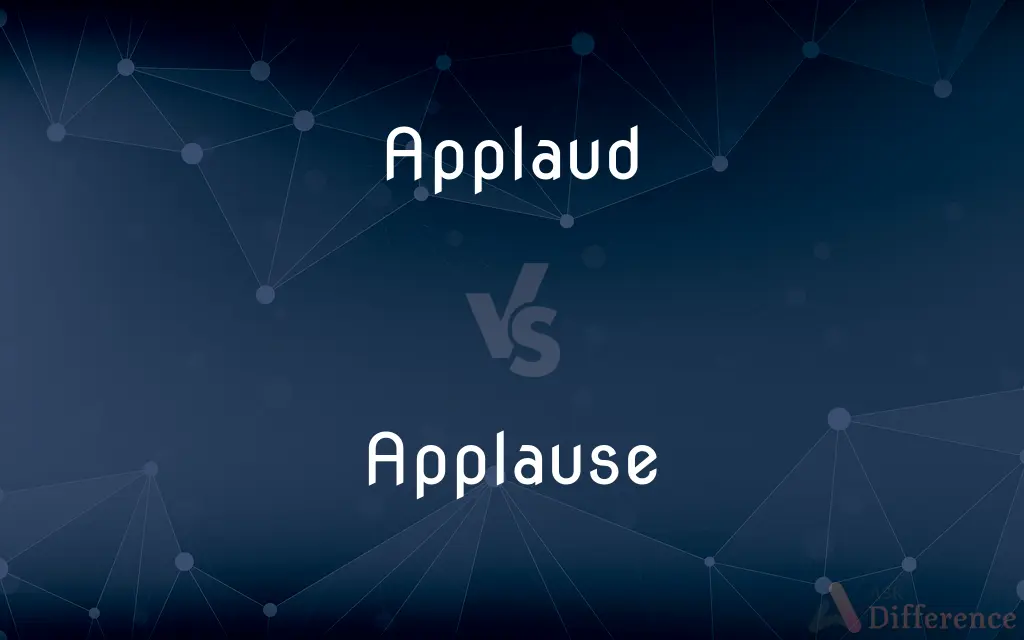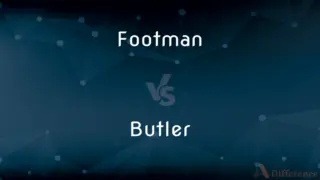Applaud vs. Applause — What's the Difference?
Edited by Tayyaba Rehman — By Maham Liaqat — Updated on April 8, 2024
Applaud is the act of showing approval or praise by clapping, while applause is the sound produced by clapping.

Difference Between Applaud and Applause
Table of Contents
ADVERTISEMENT
Key Differences
Applaud is a verb that refers to the action of expressing approval, praise, or commendation, often through the physical act of clapping hands together. It's a gesture typically made by an audience to show appreciation for a performance, speech, or event. On the other hand, applause, a noun, describes the collective sound or act of clapping by a group of people. It represents the audible response or acknowledgment from an audience, indicating approval or enjoyment.
While applaud emphasizes the individual action or gesture of clapping, applause focuses on the collective outcome or noise generated by this action. For example, after a captivating performance, each audience member might applaud to contribute to the overall applause. Applaud can also extend beyond clapping to encompass any form of expression that shows approval or support, such as verbal praise, whereas applause specifically pertains to the act of clapping.
The context in which applaud and applause are used also highlights their differences. Applaud is often used to describe the action taken by individuals, as in sentences like "They applaud the speaker's honesty." In contrast, applause is used to describe the collective reaction of an audience, as in "The applause filled the theater," signifying a communal act of recognition and appreciation.
Applaud can be used metaphorically to commend or express approval in non-physical forms, suggesting a broader range of approval mechanisms beyond just clapping. For example, "Critics applaud the novel for its innovative storytelling." Conversely, applause remains more concrete, referring specifically to the sound or act of clapping as a form of public acknowledgment.
Comparison Chart
Part of Speech
Verb
Noun
ADVERTISEMENT
Definition
To show approval or praise through clapping or other means.
The sound produced by clapping or the act of clapping as a group.
Context of Use
Individual action or expression of approval.
Collective sound or acknowledgment by an audience.
Flexibility
Can be used metaphorically to express approval in various forms.
Specifically refers to the act or sound of clapping.
Examples
"The audience applauded vigorously after the performance."
"The thunderous applause lasted several minutes."
Compare with Definitions
Applaud
To acknowledge someone's success or achievement with approval.
We all should applaud her efforts to raise awareness.
Applause
Collective clapping as a sign of enjoyment or approval.
A round of applause greeted the announcement.
Applaud
To show approval or praise by clapping hands.
The audience applauded the actors for their stunning performance.
Applause
The sound of many people clapping hands together in approval.
The applause after the concert was deafening.
Applaud
To clap at a performance or event to show enjoyment or approval.
Everyone in the hall applauded loudly after the speech.
Applause
An act of clapping intended to show admiration or support.
The speaker waited for the applause to subside before continuing.
Applaud
To express commendation or approval, not limited to clapping.
Critics applaud her approach to sustainable fashion.
Applause
A demonstration of approval or appreciation by an audience.
The actor's performance earned enthusiastic applause.
Applaud
To support or approve of an action or idea enthusiastically.
The community applauded the decision to renovate the park.
Applause
Public acknowledgment or praise expressed through clapping.
Her speech was met with warm applause.
Applaud
To express approval, especially by clapping the hands.
Applause
Applause (Latin applaudere, to strike upon, clap) is primarily a form of ovation or praise expressed by the act of clapping, or striking the palms of the hands together, in order to create noise. Audiences usually applaud after a performance, such as a musical concert, speech, or play, as a sign of enjoyment and approval.
Applaud
To express approval of (someone or something) especially by such clapping.
Applause
Approval expressed especially by the clapping of hands.
Applaud
To commend highly; praise
Applauded her decision to finish college.
Applause
Praise; commendation
A scientific discovery that won critical applause.
Applaud
(obsolete) Applause; applauding.
Applause
The act of applauding; approbation and praise publicly expressed by the clapping of hands, stamping or tapping of the feet, acclamation, huzzas, or other means; marked commendation.
Applaud
(obsolete) Plaudit.
Applause
The act of applauding; approbation and praise publicly expressed by clapping the hands, stamping or tapping with the feet, acclamation, huzzas, or other means; marked commendation.
The brave man seeks not popular applause.
Applaud
To express approval (of something) by clapping the hands.
After the performance, the audience applauded for five minutes.
Applause
A demonstration of approval by clapping the hands together
Applaud
To praise, or express approval for something or someone.
Although we don't like your methods, we applaud your motives.
Applaud
To show approval of by clapping the hands, acclamation, or other significant sign.
I would applaud thee to the very echo,That should applaud again.
Applaud
To praise by words; to express approbation of; to commend; to approve.
By the gods, I do applaud his courage.
Applaud
To express approbation loudly or significantly.
Applaud
Clap one's hands or shout after performances to indicate approval
Applaud
Express approval of;
I applaud your efforts
Common Curiosities
How do performers typically respond to applause?
Performers often acknowledge applause with bows, smiles, or verbal thanks, showing gratitude for the audience's appreciation.
What does it mean to applaud?
To applaud means to show approval, praise, or appreciation, often by clapping hands but also through other forms of acknowledgment.
What is applause?
Applause is the collective sound or act of clapping by an audience or group, expressing approval or enjoyment.
Can you applaud without clapping?
Yes, applauding can also refer to expressing approval or commendation in ways other than clapping, such as verbal praise.
Do all cultures use applause to show approval?
While applause is a common way to show approval across many cultures, some cultures may use alternative forms of acknowledgment.
Is applause always positive?
Typically, applause is a positive response indicating approval or enjoyment, but contextually, it can also be polite or obligatory, rather than genuinely enthusiastic.
What role does applause play in live performances?
Applause acts as immediate feedback for performers, indicating audience approval and enhancing the live experience.
Can applause be considered a form of communication?
Yes, applause is a non-verbal form of communication that conveys audience approval, appreciation, and engagement.
Can applaud be used in a negative context?
Applaud is generally used in positive contexts, but it can be used ironically or in a negative context to critique overly enthusiastic or misplaced approval.
Can a single person create applause?
While a single person can applaud, applause usually refers to the collective clapping of a group or audience.
Is there a difference between clapping and applause?
Clapping is the act performed by an individual, whereas applause refers to the collective clapping sound or act by a group.
Can you measure the intensity of applause?
The intensity of applause can be subjectively measured by its loudness and duration, reflecting the level of audience approval.
How does applause affect performers?
Applause can significantly boost performers' morale and confidence, reinforcing the success of their performance.
Is there a specific etiquette for applauding at classical music concerts?
Yes, in classical music concerts, it's customary to withhold applause until the end of the entire piece or work, not after individual movements.
Is there a right time to applaud during an event?
The appropriate time to applaud varies by the type of event and cultural norms, but it's generally accepted after a performance or speech concludes.
Share Your Discovery

Previous Comparison
Footman vs. Butler
Next Comparison
Boost vs. BolsterAuthor Spotlight
Written by
Maham LiaqatEdited by
Tayyaba RehmanTayyaba Rehman is a distinguished writer, currently serving as a primary contributor to askdifference.com. As a researcher in semantics and etymology, Tayyaba's passion for the complexity of languages and their distinctions has found a perfect home on the platform. Tayyaba delves into the intricacies of language, distinguishing between commonly confused words and phrases, thereby providing clarity for readers worldwide.
















































